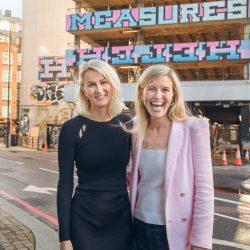
According to data from the Office for National Statistics, young people from privileged backgrounds are five times more likely to make it in the creative industries compared with their less privileged counterparts. In a bid to tackle both the diversity crisis in advertising and soften the cost-of-living impact for junior staff, independent creative agency Pablo is launching the Pablo Living Wage — a minimum annual salary of £30,000 for all full-time staff. As it stands, the national minimum wage equates to £18,964 annually, and the London Living Wage £23,302.50. This means that those team members earning Pablo’s living wage will be £6,697 better off.
MediaCat Magazine spoke to Pablo’s joint Managing Director’s, Harriet Knight and Hannah Penn, about the why behind the wage and what steps the industry can take to improve access for under-represented staff.
Can you please share some insights into how the Living Wage initiative aligns with Pablo’s broader vision for creating a more inclusive and diverse advertising industry?
Our aim at Pablo is to create an industry where all members of society have equal opportunity, and challenge the notion it’s only for the privileged few. The launch of our industry first Gender Neutral Parental Leave policy last year was the start of us taking action to meaningfully open up an industry in desperate need of diversification and better representation — a problem only being exacerbated by the cost-of-living crisis.
In 2024, we want to turn our attention to tackling one of the often-forgotten pillars of DE&I: Access. Low starting salaries mean workers from lower-income backgrounds, without support from the bank of mum and dad, simply cannot afford to take a job in the advertising industry. The beauty of advertising is that you don’t need any formal qualifications for it — it involves skills and experience that you can very much learn on the job. Which should make it the most inclusive and diverse sector, but the cripplingly low starting salaries make it a luxury most cannot afford. Our junior staff need more support, and we desperately want to welcome different brains into our industry in a meaningful way.
Our hope through the Pablo Living Wage and the further work we are doing to open up our industry in the future, is that we will create a pathway that wouldn’t normally exist for people from under-represented backgrounds.
The Pablo Living Wage is the first step on our journey at Pablo to open up access to our industry by creating more tangible opportunities for individuals who might not otherwise have been considering or aware of the careers here. Our next step will focus on a radical overhaul of recruitment practices as well as the acceleration of the Pablo Starters programme, which supports entry level talent from ‘non advertising’ backgrounds, without higher education into an apprenticeship style programme that develops skills from the ground up.
How will the agency support entry-level talent from non-advertising backgrounds and without higher education? Are there specific components of the programme that you believe will be particularly impactful?
The acceleration of the Pablo Starters programme will take place from April 2024. Here we will continue to tackle the DE&I pillar of ‘Access’, following the launch of the Pablo Living Wage, by turning our attention to opening up pathways into the industry for those who are from ‘non advertising’ backgrounds and without higher education. We are still fleshing out the details but the intention is for a year long ‘apprenticeship’ style programme in Account & Project Management which will feature ‘on the job’ training with Pablo Client’s as well as support with weekly training modules.
We are also exploring how we can further support our ‘Pablo Starters’ with subsidies for lunch and travel costs.
Considering the financial benefits of the initiative, how does Pablo anticipate this move will influence the overall culture and morale within the agency, particularly among junior staff?
When we announced the Pablo Living Wage to the wider agency the response was phenomenal. With our clients, we firmly believe in the notion that actions speak louder than words, and we live this philosophy for ourselves, too. Our people seem truly proud to be part of an agency who is willing to put their money where their mouth is, especially in the current economic climate, and lead the wider industry from the front with initiatives such as this.
It’s been really humbling to start to see other agencies follow suit with St Lukes only last week committing to raising its minimum salary to £30k as well.
We are at a point in our growth where we need to bring in the next generation of Pablos, and as a result have recently been recruiting more junior roles and new starters. As this cohort grows we want to make a commitment to them that will support their future trajectory, and create an environment where they can truly thrive, without the worry or concern of not being able to afford a career in advertising. From the 8% of staff who have been directly impacted by the Pablo Living Wage, the feedback has been extremely positive. For those of us lucky enough to work in advertising, we love what we do and work very hard to contribute to creating outstanding work.
But there is no escaping the fact that it is an industry which historically underpays its juniors — making it, at times, a labour of love, not reward — a situation which is exacerbated by the ongoing cost of living crisis. Anecdotal feedback from the Junior Pablos and the wider agency is that they feel truly valued and that Pablo is really investing and committed to developing their careers. One of the Juniors who has been impacted said: ‘It’s very affirming to work at an agency that values its junior team members and helps them as they start on the early rungs of the career ladder. The Pablo Living Wage reflects both the company’s dedication to encouraging young talent and my dedication and commitment to my role.’
Featured image: Harry Cunningham / Unsplash

